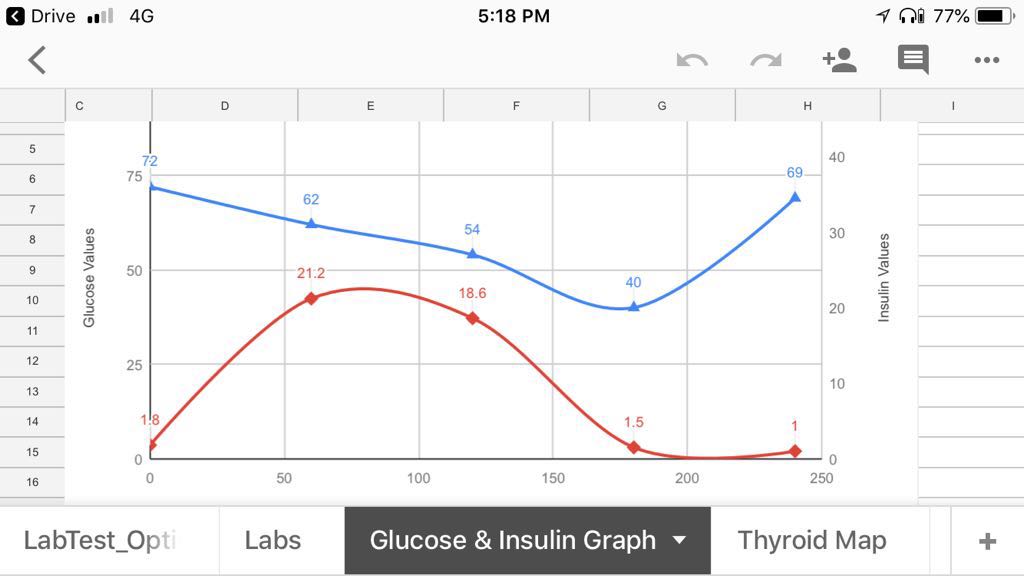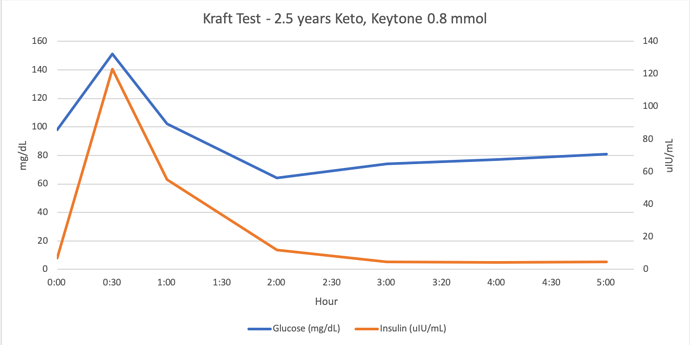Hi @V1ncentt,
Thanks for your congrats. I hoped insulin sensitivity would translate to sub 20% body fat, but that hasn’t yet happened. The realized plus is feeling safe eating all the veggies I want.
I wasn’t diagnosed with IR or diabetes/prediabetes prior to starting keto. I did have hypothyroidism, and a sleeping disorder, both originally diagnosed in the late 90’s. Hypothyroidism was well controlled with meds until a check in mid 2016 showed low free T3. Free T3 hadn’t been checked regularly prior to that date, so I don’t know if it had been off for some time, or if it had been recently influenced by keto/LCHF, which I’d been doing for about 6 months, or by nearly 2 years of dieting/restricting. Regardless, from mid 2016 until my most recent test end of June 2018, my thyroid hormones were all over the place. Currently I’m taking more T3 and less T4 than I was last year. My sleeping disorder was cured by keto. Stopped the meds in May 2016 and have never needed them again (but even a small amount of grains brings back the sleepy brain).
I started HRT because of perimenopausal symptoms, but in truth I wanted optimal hormones for youthful skin. In 2017 my periods started to wane, getting very light and then stopping in August. Simultaneously I was putting on body fat and losing muscle. I’d also developed intractable constipation (over the prior 24 months). By November, when I’d ballooned up like the Michelin Man, my testosterone and estrogen levels were super high, so I quit HRT cold turkey under the supervision of my integrative health doc. I had 1 period as soon as I stopped HRT, then nothing until a 10-day water fast at True North this March. The day I started refeeding my period returned, and it was like the periods of my youth. I’ve had a normal period every month since, though not always at 28 day intervals.
Re fixing your metabolism, I can’t say. I can only add my experience which has taught me the importance of context and individual differences. I started keto for 1 reason: losing body fat. But over time, as I became more and more integrated into keto communities, where many participants were struggling with obesity, IR, diabetes, inflammatory diseases etc, I started grouping myself in with the strict, long term protocals required to manage those disease states. I stopped ‘choosing not to eat carbs for a specified time, for a specified goal’ and became terrified to eat carbs for the foreseeable future. When I saw my OGTT chart, instead of being elated, I thought,“What mysterious and sinister blood glucose dysregulation is this?” I laugh about it now, but that just shows the fearful mindset I got myself in.
I do believe metabolism can be repaired and health can be restored. I wish you success as you sculpt a plan for your own best health.

 I have been thinking exactly the same as you. As an experiment I tried eating non-keto/100% carb for 3 days and didn’t die so I’ll go through with the Kraft test in a few weeks - got some travel coming up so I want to have ketone-fueled energy and immunity to colds, but after that.
I have been thinking exactly the same as you. As an experiment I tried eating non-keto/100% carb for 3 days and didn’t die so I’ll go through with the Kraft test in a few weeks - got some travel coming up so I want to have ketone-fueled energy and immunity to colds, but after that.

